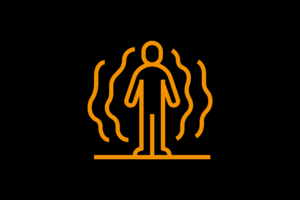Autistic people often have lower sensitivity OR higher sensitivity with their internal senses. It is common for the levels of sensitivity to change according to how relaxed, stressed or tired the person is feeling.
The scientific name for our internal senses is the Interoceptive System
Our internal senses let us know how our body feels inside so our brains can decide what we need. They help us know when we need to go to the toilet, whether we’re hungry, thirsty or if we’re feeling unwell. Our internal senses are also important for recognising the emotions we feel.
Lower sensitivity
Some autistic people don’t always sense the signs their body gives them, so they might go straight from “I don’t need the toilet” to “I need to pee right now!”. This can often happen when you have lower sensitivity to your internal senses, because you might not notice your bladder getting full until you’re at the point of bursting for the toilet. Being too hot is another example where some might not notice their body getting warmer until they become overwhelmed.
TOP TIPS
- Set reminders on an electronic device to make sure you visit the bathroom regularly, and remember to eat and drink.
- Request that family or friends remind you to remove your coat/jumper if they notice it getting warm
- Use a water bottle with markings on to help you track how much you have had to drink during the day.
Higher sensitivity
People who are more sensitive to internal feelings might find different sensations really irritating.
Disliking the way a full bladder feels can mean frequent toilet trips, and finding hunger really uncomfortable can result in the person eating more often to avoid getting those feelings.
TOP TIPS
- It might be best to eat ‘little and often’ as being full can feel just as uncomfortable as hunger sometimes.
- Try to keep plenty of healthy snacks available to grab when needed.
A lot of autistic people say they can feel “something”, but are unclear about what it means. For example, if their heart is beating fast, it can be hard to tell whether this is anxiety, excitement or a sign to take a rest after a lot of exercise. You can read more about this in our section on alexithymia.



